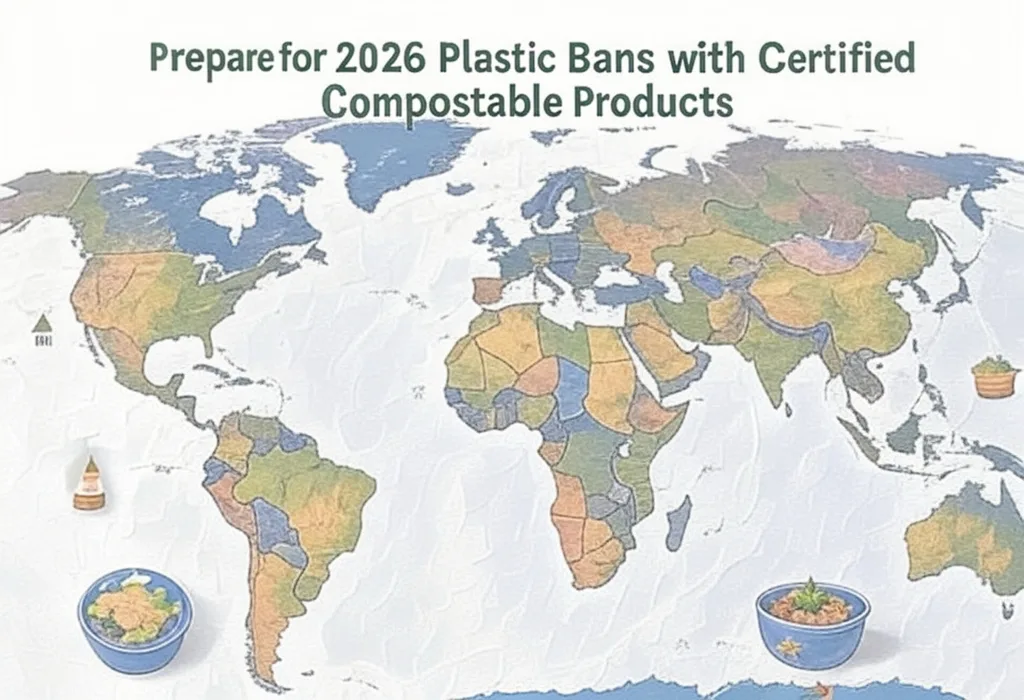As the global fight against plastic pollution intensifies, countries are implementing stricter regulations on single-use plastics. By 2026, several nations—including members of the EU, Canada, India, and parts of the United States—will expand or fully enforce bans on disposable plastic items used in foodservice.
If you’re in the food packaging or hospitality industry, it’s no longer a matter of if, but how fast you can adapt.
Let’s break down what’s coming—and how compostable foodservice products can help future-proof your business.
Understand the Scope of the Bans
Different regions are banning plastics at varying paces and scopes. Here’s a quick overview of what to expect:
EU: Under the Single-Use Plastics Directive, items like plastic cutlery, straws, stirrers, plates, and expanded polystyrene containers are already banned. By 2026, additional restrictions on packaging and labeling are expected.
Canada: Enforcing a nationwide ban on single-use plastics (cutlery, checkout bags, takeout containers) with full phase-out by 2025–2026.
India: Already banned 19 single-use plastic items. Enforcement and compliance expected to intensify by 2026.
USA: While federal regulation is lacking, states like California, New York, and Washington are implementing local bans.
Key takeaway: Even if your market hasn’t implemented restrictions yet, your buyers and partners may soon demand compliance.
Make the Switch to Compostable Foodservice Products
Compostable materials offer a practical, eco-conscious alternative to traditional plastics. They help you meet regulatory requirements without sacrificing product performance or appearance.
At Tiptopak, our flagship compostable foodservice products include:
Water-Based Coated Paper Cups (no PE or PLA) – home compostable and recyclable
PHA-Coated Paper Bowls & Trays – marine degradable, heat-resistant
Bagasse Clamshells & Trays – made from sugarcane waste, strong and compostable
Paper Cutlery & PLA-Free Lids – plastic-free, sturdy, and functional
These products comply with certifications like EN13432, ASTM D6400, BPI, OK Compost HOME, and FSC.
Prioritize Certifications and Supply Chain Transparency
As bans roll out, authorities and consumers alike will look for proof of sustainability. Invest in packaging that carries recognized third-party certifications.
Additionally, work with suppliers who can provide full traceability and sustainability documentation. At Tiptopak, we provide all necessary certifications for export markets and B2B compliance.
Educate Your Team and Customers
Switching materials means adjusting operations, training staff, and communicating new disposal methods to customers. Make sure your team understands how to handle compostable items, and consider adding educational messaging to your packaging.
QR codes linking to “how to compost” instructions can also improve customer engagement and proper disposal.
Act Now—Not Later
The 2026 bans aren’t distant anymore. Lead times for material change, design development, and supply chain realignment can stretch months. Early adoption of compostable foodservice products can position your business as a sustainability leader—not a last-minute adapter.
A Global Trend You Can’t Ignore
Single-use plastic bans are here to stay—and they’re only expanding. By switching to compostable foodservice products, your business not only stays compliant but shows responsibility to the planet and future generations.
Need help planning your packaging transition? Contact Tiptopak for tailored solutions that meet both compliance and customer satisfaction.



